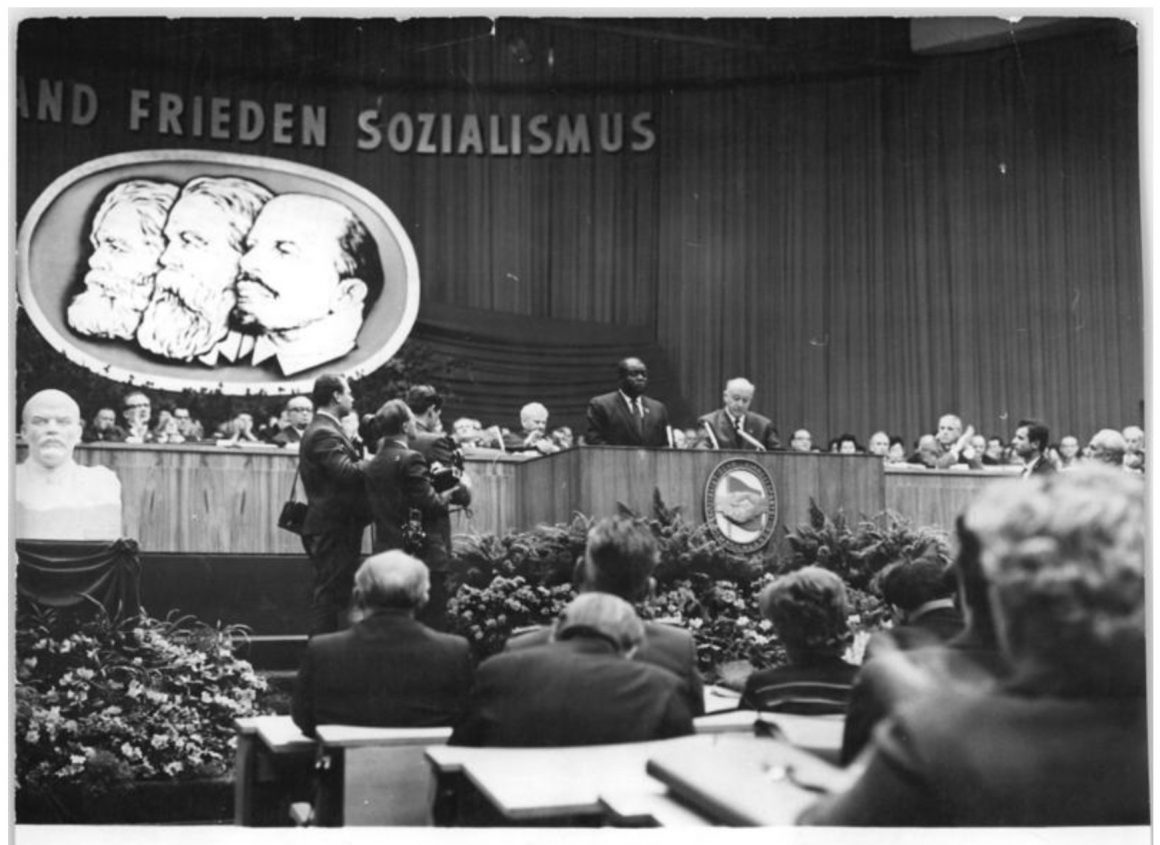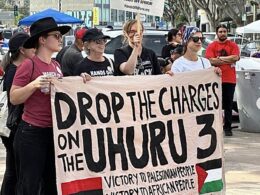Above: Henry Winston speaking in center of the image
I’ve been wrong to promote the idea that Black Americans are an “internal colony,” and the thing which convinced me of this was being exposed to the writings of historical Black Marxists. Namely Henry Winston, who represented the generation of Black Marxists that received their ideological upbringings prior to when the three-letter agencies twisted their liberation theory. When Winston polemicized against the internal colony theory, and ridiculed many of those in the new generation of Black radicals for uncritically embracing it, he wasn’t arguing from a place of being old and out of touch; it was the older generation of communists that had been able to form their worldviews via a superior framework of education, one that hadn’t been corrupted by the CIA invention which was the New Left.
Because Winston was coming from an inherently better analytical framework, these younger revolutionaries in certain cases unlearned their previous ideas, and came to reject notions like the internal colony. Huey Newton, who Winston named in the 1960s as one of these Black radicals that had mistakenly come to embrace the internal colony theory, abandoned that theory by 1970. Newton was forced to realize the same thing I recently did: that simply because the theory’s proponents are able to cite factual information about racial oppression in the USA, doesn’t mean they’re correct to analogize the country’s African diaspora to a colony. This is what Winston explained in his polemic Strategy for a Black Agenda:
By promoting the colony theory, the white ruling class aims to define and determine the direction of the Black liberation movement. In yet another form, the monopolists are striving to prevent Black people themselves from defining the specific features that constitute the special oppression they experience. By analogy, this theory directs attention to those aspects of the Black condition in the U.S. which most closely resemble colonial conditions. These similarities are so powerful that one’s attention may be diverted from what is unique in the status of the triply-oppressed Black peoples in colonial or semi-colonial situations, past or present. Via the colony analogy, and variations on this unscientific, anti-Marxist theme, U.S. imperialism’s ideologists are trying to influence the Black liberation movement into adopting a self-defeating strategy. While the U.S. “internal Black colony” theory resembles a winning strategy for an oppressed majority living in a colony, it would mean certain defeat for an oppressed minority—which has indeed been the Black condition for more than 350 years in this part of the world.
Because communists like Winston hadn’t been influenced in their ideological formative years by the anti-Marxist, pseudo-radical material that the three-letter agencies began to inject into this country’s “left” during the Civil Rights era, they were able to recognize how notions such as this one aren’t based in materialism. How rather than having a progressive impact on history, they instead act to reinforce our society’s racial divisions.
The way that somebody who’s embraced these ideas can come out of them is by taking responsibility for the effects of their thinking. When I see the proponents of the New Left’s anti-materialist theories defend their stances, their justification is that the New Left didn’t create social inequality, so therefore it can’t share any blame for the continued failure of revolutionary politics in the USA. We’re only responding to circumstances that were thrust upon us, they argue; and because our intentions are good, there’s no way we can be wrong in how we respond to these circumstances. Isn’t the hubris in this apparent? The New Left’s radical liberalism represents an ideology that one can only justify adhering to by pointing to the factors that drove them to adopt it. Its proponents can’t defend the ideas themselves, they can only try to defend their personal moral character; because I’m not trying to contribute to the damaging of the revolutionary cause, they argue, I shouldn’t have to reexamine my ideas.
Implied within these attempts to rationalize adherence to radical liberal, ultra-left ideas is the notion that these ideas have an innately progressive effect, simply due to their spreading awareness about systemic injustices. This is a miscalculation of what the best revolutionary strategy should look like. The American communists from Winston’s time were able to help build an effective civil rights movement, without embracing the anti-materialist analytical framework which the three-letter agencies want Marxists to adopt. The rise of the movement came about prior to the introduction of the New Left’s ideas, not after; and it was these ideas that ended the movement’s successes, rendering American radicalism impotent and unable to challenge the state.
The agencies created a framework which draws arbitrary, needless boundaries of demarcation between the proletarians of different colors, while incentivizing its adherents to call anyone who challenges these definitions a “class reductionist.” As Winston points out, when you’ve based your practice around the notion that everyone in the USA from a certain background is a member of what’s equivalent to a colony, the goal of interracial class unity gets undermined. Just because colonialism is how our present social divides came into being, doesn’t mean it’s accurate to sort every African diaspora person into such a rigid category.
The situation isn’t quite the same for Native people, because in colonial fashion, it’s their land that continues to be plundered by the white ruling class via capitalist resource exploitation and imperialist military activities. But even in that case, Winston’s strategic argument about the counterproductiveness of the “colony” definition as applied to a racial minority group is relevant. That the USA continues to technically be a settler-colonial entity, due to the ongoing exploitative land relationship between the First Nations and the newer government, does not mean it’s constructive to act like the interests of Native and non-Native proletarians are fundamentally at odds.
As powerful a rhetorical device as it is, the colony analogy isn’t sufficient when it comes to analyzing the conditions of the First Nations. These nations for the most part have their own governments, ones that the settlers didn’t create and that they don’t control in the way an empire would control a neo-colony; the real issue is that these nations don’t control most of the land which rightfully belongs to them. (As well as that they live under capitalism, which by design keeps most Natives in an exploited status.)
The First Nations that aren’t federally recognized as tribes can more appropriately be called colonies. Yet even then, the word “colony” has a particular definition, one whose applicability is ambiguous in such a complex and integrated cultural environment as the modern USA; can Black and Native proletarians be put into such a clearly separate social category from white proletarians, when both of them are being exploited by the same bourgeoisie and often in the same geographical proximity? Such a simplistic way of framing things, whether when talking about Black or Native people, ironically often has the effect of setting back the efforts to rectify the systemic injustices that these peoples are subjected to.
It’s undeniable that U.S. imperialism exists both externally, and internally in the form of Native land exploitation; where it becomes counterproductive is to put forth a framing that makes the shared interests of the workers from different backgrounds look trivial. The ideas that come from this framing render revolutionary politics inert, and unable to gain actual power.
That that’s not the intent behind these ideas is not ultimately relevant. All that matters is what material consequences it will have to adopt these ideas, and those consequences are the opposite of progressive. There’s a reason why these ideas have such a tragically ironic nature, where they so easily appeal to those who desire to fight for justice yet undermine these people’s ability to do that. It’s because these ideas were deliberately designed for exactly that purpose; as Winston observes, Herbert Marcuse’s Frankfurt School was where the internal colony theory got propagated within American “radical” academia, and Marcuse was a fundamentally anti-Marxist ideological leader. So anti-Marxist that he wasn’t simply giving bad counsel to Black radicals, he was also reinforcing the “uppity” stereotype about their people:
There is, of course, no more truth to Marcuse’s assertion that Ford assembly line workers go to “the same resort places” as the Ford family (except as moonlighting waiters trying to make ends meet!) than to his racist stereotype of the Cadillac-owning Black workers. It is with such fantasies that Marcuse seeks to convince us that, even though classes have not disappeared, the struggle for class and national liberation has been eliminated because of “the extent to which the needs and satisfactions . . . of the Establishment are shared by the underlying population.” This Alice-in-Wonderland vision of mass satisfaction—instead of mass hatred of exploitation, poverty and racist oppression—forms the core of Marcuse’s “revolutionary” ideology. And his inclusion of Black people among those incapable of “counteraction” is a direct ideological descendant of the racist stereotype of the “happy,” “docile” slave. It is logical that Marcuse’s contempt of the working class and of Black people be accompanied by hatred of the Soviet Union! The Soviet Union embodies the power of the working class and of formerly oppressed peoples. It is precisely such forces that will end exploitation and racism in the U.S. and internationally.
Given these parts of his beliefs that made him clearly far more of a reactionary figure than a progressive one, how is it that Marcuse was able to influence Angela Davis, who’s cited him as one of her major inspirations and an instrumental person in her development? It’s because Davis was part of the element of 60s radicals who didn’t learn to reject the New Left’s revisionism, but became more ideologically defined by it over time. The effect the Frankfurt School has had on Davis is to make her go from defending the USSR’s repression of reactionary traitors, to joining a formation after the USSR’s downfall that denounced “authoritarian” socialism. To go from being a persecuted dissident, to being a Vote Blue liberal who’s been gladly embraced by imperialism’s academic and media institutions.
The ways Davis has been captured by elite politics isn’t a conspiracy, only the predictable outcome of an opportunistic modern American “left” that’s structured to incentivize acting against the revolutionary cause. The same thing has happened with Gerald Horne; his ideas have similarly gone in a revisionist direction since the Soviet Union ended, and American Marxism became even more compromised than it already was. In an era like ours, where the American left’s proximity to communism has been fully taken away and “Marxism” is just another critical academic theory liberals can use, left public intellectuals like Horne are rewarded when they present a view of our conditions which obscures the importance of class.
When Horne promotes the myth that MAGA is a particularly working class force; or puts forth an account of the American revolutionary war that ignores class analysis, characterizing all the whites as having might as well have been slave-owners; this fits with the modern left’s preexisting analytical framework about racial inequality. The framework which portrays racism as an issue of individual responsibility, rather than as something systemic.
As I’ve said, it doesn’t matter whether it’s the intent of figures like Horne to promote ideas such as this; all that matters is the effect they’re having. And when one neglects a class analysis, in favor of one that reduces class issues to race, the effect is to isolate workers of differing colors from each other. To discourage a thinking and a practice that can let communists build a relationship with the people, since the people are seen as fundamentally untrustworthy for not sharing the New Left’s beliefs. The irony is that these beliefs are themselves mistaken, making the New Left’s commandist and elitist attitude all the more unjustified; an ideological element that’s been consistently failing to build an effective mass movement shouldn’t be calling the people stupid or evil. It should be looking for what might be wrong with its own thinking.
Davis and Horne have institutional backing because even when a public figure calls themselves a “Marxist,” if they promote the Frankfurt School’s anti-materialist ideas they’re an asset for monopoly capital. The effect of what they do is to dissuade oppressed peoples from uniting with those they need to unite with in order to win. From adopting the non-sectarian, non-separatist strategy that Winston concluded is the only path towards liberation:
For colonial peoples, liberation starts with rejection of the myth that their fate can be determined “jointly” within the framework of the tight controls that link it to the U.S. economy. For the Black people in the US, on the other hand, liberation is realizable only on the basis of overcoming exclusion and inequality through an anti-monopoly movement, in which the Black people and all who are exploited by the common corporate enemy seek to establish joint control of the country’s economy. It is within such a revolutionary process that Black people will gain full and equal participation in the entire economy, and equality of representation in all aspects of the social, political, economic and governmental life of the country. The ideology of separatism, of determining “Black destiny” on a go-it-alone path—rejecting united action with non-Black opponents of monopoly power—is in today’s context equivalent to the idea of emigration to Canada or Africa counterposed by some as an alternative to Douglass’ strategy of forming an anti-slave power coalition—the strategy which did ultimately bring an end to chattel slavery.
(Note that when I say “non-separatist” in regard to the First Nations, I’m not objecting to the idea that they should gain full sovereignty, nor to the idea that the USA is now historically outmoded and should be abolished. I only mean whatever formation we have post-revolution should be centralized to some extent, instead of a chaotic situation where every government is fully separate.)
To achieve the modern equivalent of what Douglas did; to put an end to this empire that both terrorizes the world and perpetuates the exploitation of the core’s workers; we’ll need to join with the united front against NATO. Our capitalist dictatorship won’t become vulnerable to defeat until we’ve seriously combated imperialism’s narratives; doing so will both disrupt Washington’s global war operations, and make our domestic liberal reformists no longer able to dominate organizing spaces. The most impactful thing we can do at this stage is to advance the anti-NATO movement by any means necessary, which means prioritizing unity among anti-imperialists. This is important for the same reason Douglas had to coalition-build, and Lenin had to work with non-left trade unionists: because to be effective, these progressive figures needed to collaborate with others who shared their concern over the moment’s most significant aspects of the class struggle.
What does it say that this historically proven revolutionary strategy is seen as unthinkable according to the orthodoxy of today’s “left?” The purity fetish mentality within today’s “Marxist” spaces denies the way revolutionary change actually works. It acts like all contradictions can be rectified if we isolate ourselves from the types of anti-imperialists who aren’t seen as palatable, and try to defeat NATO’s psyops while working only with radical liberals.
Such a practice is commandist in nature, based in a way of viewing the world that’s not pragmatic but idealist; we can’t force or expect movements and people to conform to our particular view of the world, we have to act according to what the circumstances allow us to do. We won’t realistically be able to eliminate all backwards sentiments in our society until we’ve created socialist state power, and can expose everyone to a better type of education. Which won’t be possible without carrying out the practical actions required to win against the capitalist state.
As we build the movement that can bring us this victory, we’ll find that simply exposing individuals with backwards views to the revolutionary struggle can bring them to a more progressive consciousness. Working class whites who held racist views became anti-racist after allying with the Panthers, and hearing about the power of interracial proletarian solidarity. Entire countries have underwent shifts in consciousness after their conditions have progressed. We should have great optimism about the potential we have to change our cultural narratives. This optimism is hard to come to, if not impossible to come to, when one has the insular mindset the New Left has normalized within activism spaces. The logical conclusion of viewing Black Americans as a colony; of ignoring the historical and present examples of workers achieving progress regardless of their racial identities; is to come to see the people in general as enemies, rather than as potential allies.
————————————————————————
If you appreciate my work, I hope you become a one-time or regular donor to my Patreon account. Like most of us, I’m feeling the economic pinch during late-stage capitalism, and I need money to keep fighting for a new system that works for all of us. Go to my Patreon here. To keep this platform effective amid the censorship against dissenting voices, join my Telegram channel.








